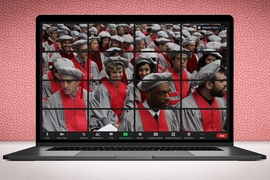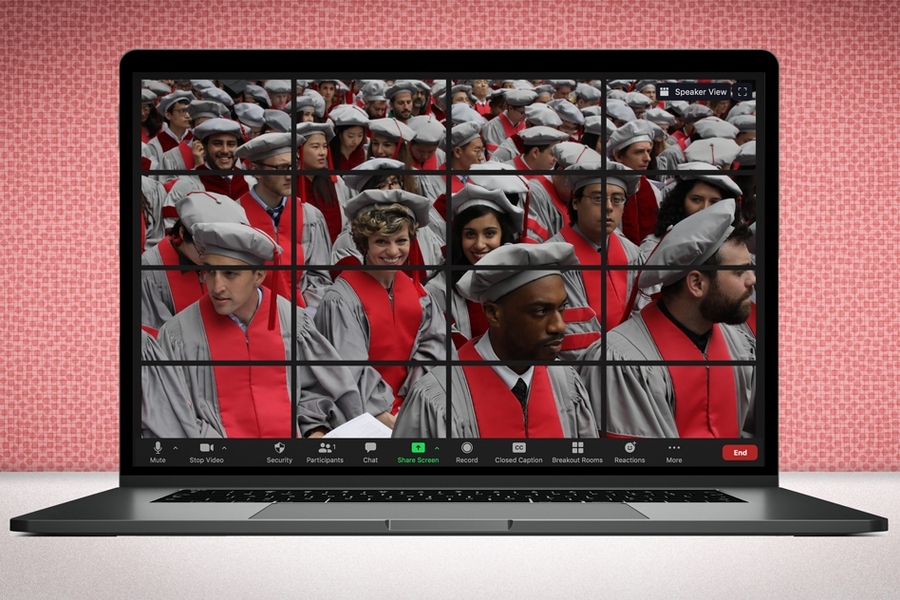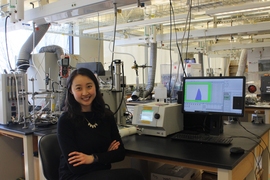Call it another MIT innovation. When PhD student Jesse Tordoff passed her dissertation defense this month, she learned about the outcome in a new way: Her professors sent a thumbs-up emoji on the Zoom screen they were all sharing.
Welcome to the new world of the online dissertation defense, one of many changes academia is making during the Covid-19 pandemic. For generations, dissertation defenses have been crowning moments for PhD candidates, something they spend years visualizing. At a defense, a student presents work and fields questions; the professors on the dissertation committee then confer privately, and render their verdict to the student.
Which, in Tordoff’s case, was delivered in good humor, via a familiar little symbol.
“That was my most 2020 moment, learning I passed my defense by Zoom emoji,” says Tordoff, a biological engineer specializing in self-assembling structures.
With the pandemic limiting activity on the MIT campus from mid-March onward, moving dissertation defenses to Zoom has been a necessary adjustment. MIT students who defended dissertations this spring say they have had a variety of reactions to the change: They appreciated that family members could suddenly watch their defenses online, and some felt more relaxed in the format. But students also felt it was more challenging to engage with their audiences on Zoom.
And, inevitably, social distancing meant students could not gather in person with advisors, friends, and family to rejoice, as per the usual MIT tradition.
“That feeling of celebration — it is not something you generate by yourself,” says André Snoeck, who in late March defended his dissertation on last-mile issues in supply chains, for MIT’s Center for Transportation and Logistics.
That moment when you learn you have passed your doctoral dissertation defense. Congratulations to @MITSloan's Dr. Maarten Meeuwis!@MIT @MITGradStudents @MIT_alumni @MITSloanAlumni pic.twitter.com/U7wNdmBPx7
— MIT Sloan PhD (@MITSloanPhD) April 21, 2020
On Zoom, grandparents in the room
Dissertation defenses are typically quasipublic events, where an audience can attend the student’s presentation but then leaves before faculty tell a student if the defense was successful. Many MIT departments stage parties afterward.
A defense on Zoom means the circle of attendees is no longer restricted by geography — something students appreciated.
“My mom logged on in South Africa from her retirement village and watched online,” says Ian Ollis, from the Department of Urban Studies and Planning, who in May defended his dissertation about public perceptions of mass transit in the Boston area. “She wouldn’t have been able to do that if it was done in person.”
Julia Zhao, a Department of Chemistry PhD student, says the defense was a unique opportunity for family and friends to watch her in a professional setting.
“It was nice to see all my friends, and my family could attend too,” Zhao says, whose research focuses on polymers that have both metal and organic components. “They were going to fly in for graduation but not attend my defense, so they got to sit in on that and listen to me talk about what I’ve been doing the last five years. So that was really cool.”
Tordoff also felt that on Zoom, she could focus more easily on her remarks.
“I was less nervous than if I had been standing up there in front of a group of people,” Tordoff says. “I was sitting on my couch.” One reason for that good feeling, Tordoff adds, is that when she logged on to Zoom before the defense, the only other people already there were her grandparents, watching from England.
“I was so happy,” Tordoff says. “That never would have happened in person.”
And in Snoeck’s case, his advisors did orchestrate a virtual toast after the defense, so they could celebrate simultaneously, if not in the same room.
Congratulations Dr. Julia Zhao (@jouleszhao)!!!
— The ~Remote~ Jeremiah Johnson Group (@johnsonchem) May 1, 2020
Today was her defense through zoom!!! We are so proud of how you finished your PhD through a pandemic in such an impressive fashion!!! @ChemistryMIT #PhDone #AcademicChatter pic.twitter.com/En5gCtDZjQ
Kudos from strangers
At the same time, MIT students note, being on Zoom limited their interaction with the audience, compared with the nature of an in-person talk.
“You can’t read the room,” Ollis says, adding: “It’s different. You don’t have a complete perspective on the audience — you see squares of people’s faces, whereas if you do it live, you get a sense of who you’re talking to by seeing faces you recognize.”
The slightly mysterious nature of Ollis’ audience became apparent to him almost immediately after he wrapped up his online defense.
“There were quite a few people watching, who, well, I didn’t know who they were,” Ollis says. “I’ve been staying in the Ashdown grad dorm, and I was walking to the elevator after doing the defense, and somebody walked past who I didn’t recognize, and said, ‘Hey! Good job! I enjoyed that!’ I had no idea who the person was.”
Overall, Ollis says, “I thought it was a good experience. I got good feedback from people.” Even so, he adds, “I prefer being in a room with people.”
For his part, Snoeck, who has accepted a job with Amazon, felt his defense was somewhat “more like a series of Q&As, rather than a conversation” — simply due to the dynamics of the format, like the segmented nature of Zoom and its slight delays in audio transmission.
“It is weird to have a conversation with some lag in it,” notes Zhao, who will soon begin a job with a Boston-area startup, developing hydrophobic coatings. “But I made an effort to say, ‘If I interrupted, please continue.’ It is a little awkward.”
I am very happy, honored and thankful to announce I successfully defended my PhD at MIT last Monday! Special thanks to all mentors and colleagues for your guidance and support during the last five years. pic.twitter.com/bsn4RA2nbk
— Felipe-Oviedo (@felipeoviedop) May 14, 2020
The blended defense
That said, for years now, academic faculty have sometimes been participating in dissertation defenses via Skype, Zoom, and other platforms. That typically happens when dissertation committee members are located at multiple universities, or when a professor is traveling for research or a conference. In Snoeck’s case, one of his committee members was already going to join remotely from the Netherlands anyway.
Zhao noticed a student in her department webcasting their defense last year, which seemed “a little out of the ordinary” in 2019, she recalls. But from 2020 onward, it may become standard.
“It’s kind of nice to have an extra component of people who aren’t in town but want to participate in the closing of your degree,” Zhao says. “It will definitely be more normalized, I think.”
Not all MIT PhD students defend dissertations. In MIT’s Department of Economics, the thesis consists of three papers that must be approved, and there is no formal defense, although finishing students do give fall-term presentations. Still, even for economics students, this year seems different.
“The biggest challenge has been a feeling of a lack of closure,” says Ryan Hill, a graduating MIT PhD in economics, who studies the dynamics of scientific research. “It’s been a long road.” In that vein, Hill adds, “I was really looking forward to commencement, and the doctoral hooding ceremony.” Those events will take place on May 29, online, with an in-person ceremony to be held at a later date.
To be sure, Hill is keeping matters in perspective. “In the grand scheme, it’s not bad,” says Hill, who will spend a year as a Northwestern University postdoc, and has accepted a tenure-track job at Brigham Young University.
For any new PhD, crossing that academic finish line is a huge achievement — and relief. Zhao, for instance, had to scramble to complete her lab research before MIT shuttered, and then finish writing the thesis, before the dissertation defense could occur.
“It’s been a pretty crazy two months,” Zhao reflects. “I’m just happy to be done with it.”












